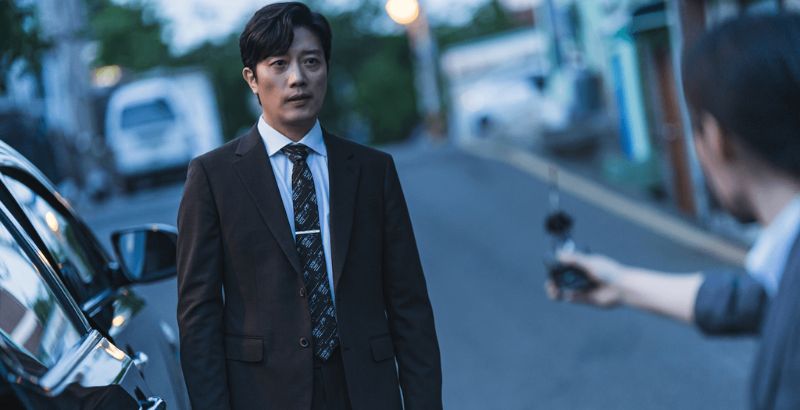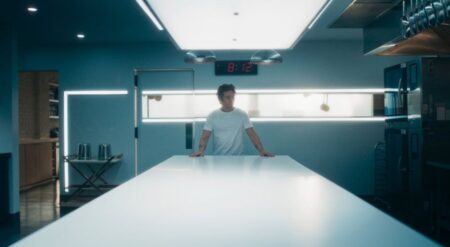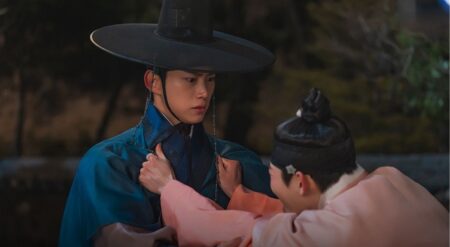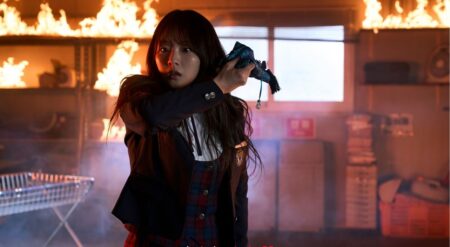
Kim Hye-ju was living a quiet life. Despite her husband’s status as an Assembly Man in the government, she has remained hidden away, caring for their daughter and working in her small business, restoring old books. But her quiet life soon begins to fall apart. When her son turns up dead on the banks of a river, it will trigger a sequence of events that will reveal truths about her world that will challenge her beliefs while forcing her to confront the nightmares of her past in Trolley.
While the various stories that come to intertwine to make up Trolley‘s narrative become numerous by the end, the vast majority of them ultimately revolve around sexual assault and the struggles the survivors face when trying to overcome it. Public opinion, invasive reporting, and false accusations are all seen en masse as the show navigates its way through a complex tapestry of pain, survival, and ultimately hope. Standing at the center of this chaotic vortex is Hye Ju.
Hye-Ju, played by Kim Hyun-Joo, provides the perfect centerpiece for the show’s unfolding drama. Her empathy, resilience, and conviction all come together to make her the perfect protagonist for this story. Her pain is always felt vividly thanks to Hyun-Joo’s powerful performance, which gives the viewer no choice but to fully appreciate the depths of pain, loss, and exhaustion she feels as she weather’s the show’s many emotional storms. I could go on forever ranting about how perfect this character is. But in order to avoid spoiling anything, and there is a lot to spoil, I’ll cap this off by saying that whenever you think you won’t be able to love this character more, you will.
The other character in Trolley‘s cast that deserves singling out is Kim Soo-Bin, played by Jung Soo-Bin. Soo-Bin’s part in the narrative is one of the most evolving of the story. Who she is and her true connection to everything are never really locked down till the final episode, but what she continually brings to the narrative is wonderful. Her perspective is used frequently to frame the show’s moments in a way that only her character can. Her interactions with Hye-Ju and how the two women’s connection grows throughout the series is beautiful to behold.

While I loved every reveal and felt every hurtful moment of this series, it isn’t without its faults, minor though they are. The biggest problem for the series comes with just how many strands the plot eventually takes on. It gets a little muddled in the middle, and I felt like the core narrative is sometimes put on hold a bit too long to bring new plot threads forward that may not have been necessary.
Another element of Trolley I can see not working for some viewers is how many of Trolley‘s reveals are brought to light. Throughout the show’s 16 episodes, viewers will witness interactions take place in such a way that it appears that you have been shown everything, only for the series to return to it later to reveal more. While I often find this sort of illusion to be a poor way to trick the audience, I find it genuinely works here. As the traumas of individuals come to light, this approach to its narrative helps the viewer understand how critical a single line or moment can be to such delicate narratives. How people see situations like these can be completely altered with a single detail originally withheld from them.
Despite a minor narrative setback or two, Trolley delivers a powerful, emotional story that demands fortitude, not just from its cast but the viewer as well. While I cheered for Hye-Ju, I also occasionally dreaded what new hurt the series would present me with. But, I was so compelled by the powerful performances and excellent storytelling to continue watching to the very end. To abandon the characters halfway through their journey was unthinkable to me.
Trolley is streaming now on Netflix.
Trolley
-
Rating - 9/109/10
TL;DR
Despite a minor narrative setback or two, Trolley delivers a powerful, emotional story that demands fortitude, not just from its cast but the viewer as well.






